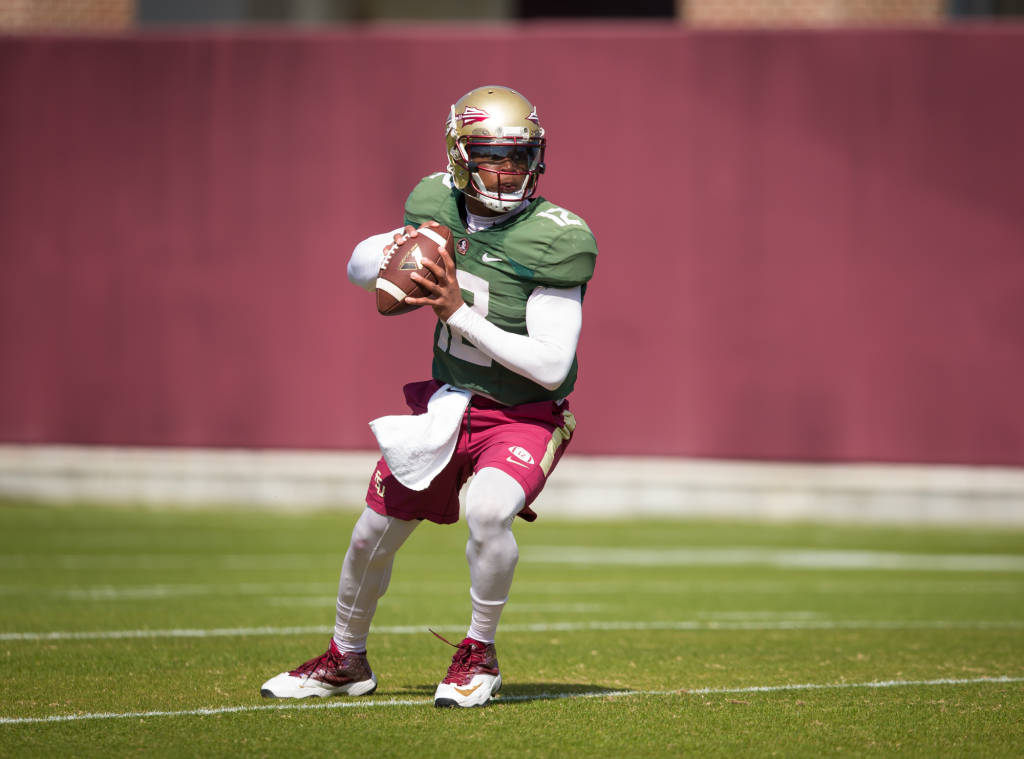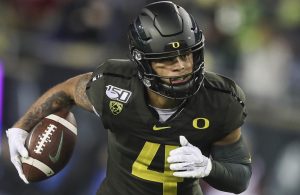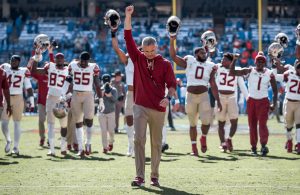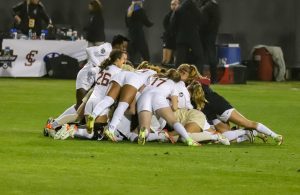- Sunday Seminole Summary: FSU Football Adds Pair of WR Transfers
- Sunday Seminole Summary: FSU Football Exits ESD With Top-15 Class
- Sunday Seminole Summary: FSU Soccer Tops BYU for Third National Championship
- Sunday Seminole Summary: FSU Soccer Advances to National Championship Match
- Seminole Sunday Summary: FSU Soccer Heads Back to College Cup
- Seminole Sunday Summary: FSU Soccer Reaches Sweet 16; Football Tops Boston College
- Seminole Sunday Summary: FSU Soccer Wins ACC, Advances to Second Round of NCAA Tournament; FSU Football Rallies Past Miami
- Seminole Sunday Summary: FSU Soccer Tops Wake on OT to Advance to ACC Final
- Seminole Sunday Summary: FSU Football Crushes UMass for Third Straight Win
- Seminole Sunday Summary: FSU Soccer Stays Perfect with Pair of Wins
By the Numbers: How FSU Has Fared with a Second-Year Starting QB
 Ross Obley/FSU athletics
Ross Obley/FSU athleticsFlorida State will lose a lot of key pieces from last year’s Orange Bowl winning team, but it will return a decent number as well. Perhaps the biggest is starting quarterback Deondre Francois.
After earning ACC Rookie of the Year honors last season, Francois will have a relatively new supporting cast around him. Francois will lose his leading rusher, receiver and best offensive lineman from last year, but the expectations are high nonetheless.
We previously looked at how starting quarterbacks to start as redshirt freshmen fared as sophomores. Today, we’ll look at how FSU as a team has fared with starting quarterbacks from their first year as a starter to their second. Below is a by-the-numbers look:

The list includes Florida State quarterbacks over the last 25 years. On three occasions, FSU’s final record and ranking improved in the starter’s second year. On three occasions, its final record and final ranking worsened. On one occasion, its final record worsened, but ranking stayed the same and on another, its final record stayed the same (going on the “games behind” formula), but final ranking got worse.
Two of Florida State’s three national championships however, came with a second-year starter at quarterback. Many feel FSU would have won the national championship in 1998 had Chris Weinke not injured his neck, but even if the Seminoles did take the title, it would have been with a loss as opposed to a perfect season the following year.
Weinke was the first quarterback on this list to be a 3-year starter, but since 2001, the Seminoles have had three 3-year starters under center. In the transition from the first year to the second under Chris Rix, Drew Weatherford and Christian Ponder, FSU fared worse as a team. Both Rix and Weatherford did regress statistically, but that was not the case with Ponder.
Though the Seminoles went from a 9-4 team in Ponder’s first season as a starter to 7-6 in his second, Ponder actually improved immensely as a passer. Ponder missed the final four games of 2009 with a separated shoulder, but saw statistical jumps in completion percentage, yards per attempt and touchdown-to-interception ratio.
As with most charts, correlation does not necessarily equal causation and that’s especially true with Ponder. With Ponder at the helm in 2008, FSU averaged 29 points against FBS competition. In 2009, that number rose to greater than 32, but struggles on defense resulted in a worse win-loss record.
Only two of the quarterbacks on the list come since Jimbo Fisher became Florida State’s head coach — E.J. Manuel and Jameis Winston. Manuel took FSU from a 9-4 team during his first year as a starter to a 12-2 ACC championship team in his second. In 2011 however, Manuel missed a pair of starts that resulted in losses.
Not much should be taken away from Winston’s first year as a starter to his second. While Winston, the 2013 Heisman Trophy winner, did regress statistically, there was virtually no room for team improvement outside of going 15-0 and winning a second straight national championship.
So what does all of this mean for Francois? The short answer is probably not much.
Football is a team sport and that’s how teams win and lose. In two of Florida State’s three losses last season, the Seminoles scored at least 34 points. Twice, it scored 20 or less in victories.
It is worth noting however, that in three of the four seasons where the Seminoles saw regression with a second-year starter, the team got worse defensively. The one exception was from 2005 to 2006 with Weatherford, but the improvements were marginal as FSU ranked 15th both seasons in yards per game allowed.
With that said, it’s possible that either Francois and/or the FSU offense take a step back and the team still improves. The offense and defense could both take steps back statistically and the team could still improve. Conversely, FSU could improve on both sides of the ball and finish with a worse record or lower ranking in 2017.
Often times, teams returning a starting quarterback are the recipient of preseason optimism or are more likely to earn the “contender” label. Recent history however, has shown that having a second-year starter doesn’t equate to more success. This isn’t just true for Florida State. Six of the last eight national champions won their titles with first-year starters.
Mike Ferguson is the editor of The Daily Nole. Follow Mike on Twitter @MikeWFerguson
About Mike Ferguson
Mike Ferguson is the editor of The Daily Nole and former editor of Noled Out. Mike has more than seven years experience as a sports writer including the last four in print and online media. Mike graduated from Florida State University in 2009 with a Bachelors in Religion and a minor in Communications. Mike provided press coverage of Florida State's run to the 2013 BCS National Championship. Mike is also a news reporter at Polk County's newspaper, The Ledger in Lakeland, Florida. and contributes to Athlon Sports and ACCSports.com. Mike has been featured on sites as prominent as Yahoo Sports, FoxSports.com, Associated Press and the front page of SI.com while interviewing athletes as high profile as 2013 National League MVP, Andrew McCutchen. Email Mike at Mike@TheDailyNole.com. Follow Mike on Twitter @MikeWFerguson.




You must be logged in to post a comment Login